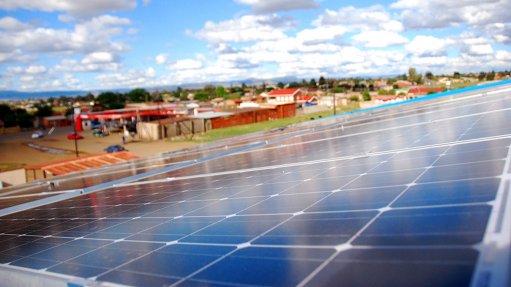
Thin-film solar photovoltaic (PV) module manufacturer First Solar, of the US, remains optimistic about prospects for its solution in South Africa, despite a sharp decline in the prices bid for PV projects during the most recent bid window under the Department of Energy’s Renewable Energy Independent Power Producer Procurement Programme (REIPPPP).
Regional director for sub-Saharan Africa Johan Cilliers believes that PV tariffs have “bottomed” and are unlikely to fall further, particularly in light of rising global demand for modules and ongoing industry consolidation. During the third REIPPPP bid window the average price tendered fell to R881/MWh, compared with R1 645/MWh in the second round and R2 758/MWh in the first.
“The prices cannot continue to fall and I expect that during future windows the tariffs bid will either match those in the third round, or rise slightly.”
First Solar, which has more than 8 GW installed worldwide and a further 3 GW under development, refrained from participating in the third round, which, in the PV sector, was dominated by Enel Green Power’s corporate-financed submissions. In fact, of the six PV projects named as preferred bids, the Italian group participated in four with a collective capacity of 314 MW – representing more than 65% of the 435 MW allocated to PV projects during the round.
Cilliers remains full of praise for the process being pursued by the South African government, describing it as “well organised and well managed”. He adds that the Nasdaq-listed company will continue to have an appetite for future competitive bidding rounds and reports that intensive work is under way to secure projects, partners and align First Solar’s offering with government’s desire for higher levels of local content.
In parallel, however, it is also pursuing prospects arising in other parts of sub-Saharan Africa, as well as for deploying the technology alongside diesel facilities at factories and mines to improve supply security and lower costs.
Cilliers is particularly bullish about the outlook for such hybrid solutions in the rest of Southern Africa, which could help governments and corporates reduce their diesel consumption.
“With fixed pricing and no fuel-price volatility, solar represents a meaningful value proposition for anyone burning liquid fuel as their primary energy source,” he argues, adding that its thin-film solution offers material performance advantages in high-temperature conditions.
He says developers are increasingly alive to the advantages of the thin-film modules in lowering the levelised cost of electricity from solar plants, but adds that First Solar aims to intensify its marketing efforts throughout the region during 2014.